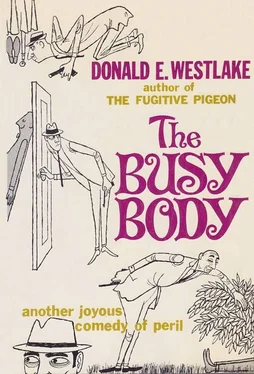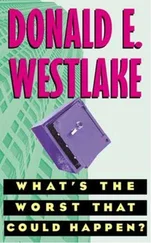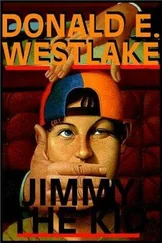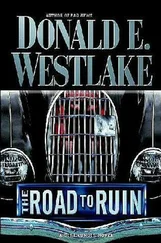Donald Westlake - The Busy Body
Здесь есть возможность читать онлайн «Donald Westlake - The Busy Body» весь текст электронной книги совершенно бесплатно (целиком полную версию без сокращений). В некоторых случаях можно слушать аудио, скачать через торрент в формате fb2 и присутствует краткое содержание. Город: New York, Год выпуска: 1966, Издательство: Random House, Жанр: Иронический детектив, на английском языке. Описание произведения, (предисловие) а так же отзывы посетителей доступны на портале библиотеки ЛибКат.
- Название:The Busy Body
- Автор:
- Издательство:Random House
- Жанр:
- Год:1966
- Город:New York
- ISBN:нет данных
- Рейтинг книги:5 / 5. Голосов: 1
-
Избранное:Добавить в избранное
- Отзывы:
-
Ваша оценка:
- 100
- 1
- 2
- 3
- 4
- 5
The Busy Body: краткое содержание, описание и аннотация
Предлагаем к чтению аннотацию, описание, краткое содержание или предисловие (зависит от того, что написал сам автор книги «The Busy Body»). Если вы не нашли необходимую информацию о книге — напишите в комментариях, мы постараемся отыскать её.
The Busy Body — читать онлайн бесплатно полную книгу (весь текст) целиком
Ниже представлен текст книги, разбитый по страницам. Система сохранения места последней прочитанной страницы, позволяет с удобством читать онлайн бесплатно книгу «The Busy Body», без необходимости каждый раз заново искать на чём Вы остановились. Поставьте закладку, и сможете в любой момент перейти на страницу, на которой закончили чтение.
Интервал:
Закладка:
She was a good driver, if a little too competitive. She jockeyed the Mercedes through the narrow Village streets, occasionally leaving shouters and fist-shakers in her wake, and eventually found a ramp up to the West Side Highway, heading north. Comfortably settled in the middle lane, she glanced at Engel and said, “You seem somehow withdrawn tonight. As though you had a rough day.”
“Yeah, that’s what I did all right. I had a rough day.”
“Gangster business?”
The phrase was meant to make him laugh, and he did. “Gangster business,” he said. “I’m looking for something that belongs to my boss.”
“Something stolen?”
“Lost, strayed, or stolen. I’ll tell you when I find it.”
“Was that why you were at the funeral parlor today? Looking for it there?”
Engel decided not to give her any sort of specific answer. A simple lie — that he’d been there to pay the Brody bill, for instance — would have ended the matter there and then, but he knew she meant to pump him for his reason for seeing Kurt Brock and it amused him to play it dumb but cozy, make her work for her misinformation. So he said, “Not really. I have all kinds of gangster business.”
“Oh, then it was gangster business that brought you there.”
“I wouldn’t say that. Listen, it’s too nice a night to talk about funeral parlors.”
“Of course,” she said, but she couldn’t hide the disappointment in her voice.
It was now fully night, a beautiful spring night in the only time of the year when New York City is habitable. At no other time is the air clear, is the sky clean, do the streets and buildings give any indication of personality and color beneath the all-embracing grime. Speeding up the West Side Highway, elevated above the crasser level of the truck-bound streets, the city on their right and the Hudson River and Jersey shore on their left, they were as close as human beings can get to the setting of a thirties movie musical.
There were, naturally, huge billboards boosting beer and trucking companies lining the route on their right, interrupting the view of the city, and across the river, in red neon letters quite large enough to be read from here, blinking slowly on and off, was the one word: SPRY. Women in passing automobiles, caught up in a drifting romantic dream, on seeing that word in the middle of the panorama of night, turned to their husbands and, “Remind me from now on,” they said, “to use Crisco.”
Mrs. Kane tried no longer on the drive to get information out of Engel. They talked casually, comfortably, about the weather and the city and the driving and other impersonal subjects, and when the silences came between topics they let them come without worrying about them.
At 72nd Street the West Side Highway became the Henry Hudson Parkway. No longer an elevated highway, it raced now amid landscaped greenery, bulky elderly apartment houses on their right. Ahead, gleaming across the river with all its lights, was the George Washington Bridge.
Engel had no idea where Mrs. Kane was taking him, and he didn’t worry about it. He sat back in the good car and relaxed. No more did he try to kid himself that he was working. He’d stopped working for today. Tomorrow was soon enough to worry some more about Charlie Brody.
At the bridge they left Henry Hudson and his Parkway, joined the Cross-Bronx Expressway for an elevated trip through some of the less attractive purlieus of New York, thence to the Hutchinson River Parkway north out of the city and out of the state. At the Connecticut line the name changed to Merritt Parkway, and at that point Engel said, “Where we going?”
“A little place I know. Not much farther.”
“We have to drive back, too, you know.”
She glanced at him again, amused. “Do gangsters have to get up early in the morning?”
“That depends.”
They left the Parkway at the Long Ridge Road exit, and drove north a few miles farther before at last she turned off the road and into the parking lot next to a one-time barn now converted into a restaurant called The Turkey Run.
Inside, The Turkey Run was determinedly rustic. Everything was wood, and none of it was smooth. Enough carriage wheels were suspended from the ceiling or hung on the walls or used as room dividers to keep the Conestoga Company in stock for a month. If the lamps on the walls and on the tables didn’t look like kerosene lamps it wasn’t the designer’s fault.
There would be, the mustachioed and absurdly-French waiter told them, a short wait for a table. Would they prefer to wait at the bar?
They would. Over a Scotch sour, Mrs. Kane became moody. “Murray and I used to come here so often,” she said. “It’s hard to believe we’ll never come here again. All that’s behind me now, that way of life.”
“It must have been a shock,” Engel said, because you had to say something in response to a line like that.
“And so — so silly,” she said. “So unnecessary.”
“Do you want to talk about it?”
She smiled at him, a little crookedly, and rested her hand on his forearm. “You’re sweet,” she said. “And yes I do. I’ve had no one to talk to, no one. I’ve had to keep it all bottled up inside.”
“That’s no good,” Engel said. He found himself thinking how different this one would be from Dolly, contrasting in imagination their individual styles and responses, and forced his mind away at once from such conjectures. That was pretty low of him, he thought, all things considered.
“Murray was a garment manufacturer,” she said. “In negligees.”
“Uh huh.”
“Evening Mist Negligees? You don’t know the brand name?”
Engel shook his head. “Sorry.”
“Well, of course, women would be more likely to know it.”
“Sure.”
“That’s how I met him. I was a model, and we met at a style show. At first I thought — well, the things people say about the garment business are all true, but — but Murray was different. So sweet, so attentive, so sincere. We were married in seven weeks, and I never regretted it, not for a minute. Of course, there was the age difference, but that didn’t bother us. How could it? We were in love.”
Engel said, “Uh huh,” and pulled at his drink.
Mrs. Kane also worked a bit at her Scotch sour. “We had an apartment in town,” she said, “and a place in the country. Not far from here, near Hunting Ridge. That’s how I happen to know this restaurant, we used to come here so often, so often. And then, of course, Murray had his business, in a loft on West 37th treet. That’s where it happened.”
“Mm hmm?”
“Murray — well, Murray was more than just a businessman. He’d started in the trade as a designer, and he still did many of his own designs for Evening Mist. He liked very often to stay in the plant in the evenings, alone, after everyone else had gone, and work in his office.” She closed her eyes. “I can just see him there, the big fluorescent light on over his head, he bent over his desk, the rest of the loft dark and silent, the bolts of cloth stacked up everywhere.” Abruptly again she opened her eyes. “The way the Fire Department reconstructed it,” she said, “some of the wiring had become frayed and dangerous. It was such an old building. All at once there was a short-circuit, a fire. All that delicate flimsy cloth, bolt after bolt of it, the fire just swept through it. Of course the sprinklers went on, but they weren’t enough. The rest of the building survived, but the interior of the loft was burned to a crisp.”
Engel reached out and took her hand, and found it cold. “If you don’t want to—”
“But I do, I do. Murray was cut off, you see, from both doors. Being in his own little cubicle, separated from the rest of the floor, it protected him a little, but not enough. In that heat, in all that flame—”
Читать дальшеИнтервал:
Закладка:
Похожие книги на «The Busy Body»
Представляем Вашему вниманию похожие книги на «The Busy Body» списком для выбора. Мы отобрали схожую по названию и смыслу литературу в надежде предоставить читателям больше вариантов отыскать новые, интересные, ещё непрочитанные произведения.
Обсуждение, отзывы о книге «The Busy Body» и просто собственные мнения читателей. Оставьте ваши комментарии, напишите, что Вы думаете о произведении, его смысле или главных героях. Укажите что конкретно понравилось, а что нет, и почему Вы так считаете.












